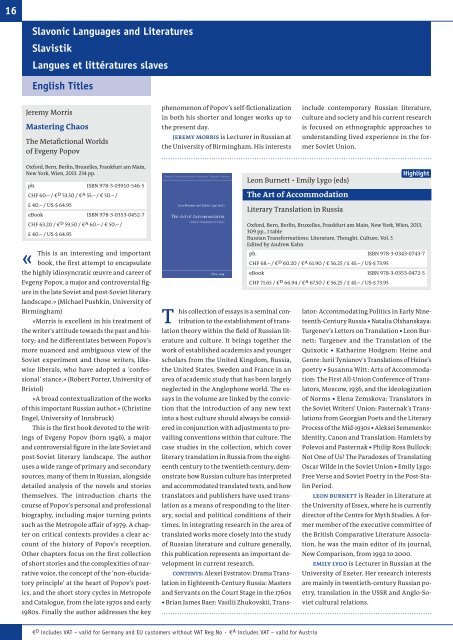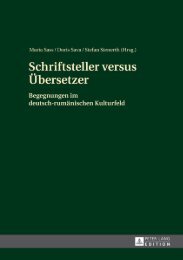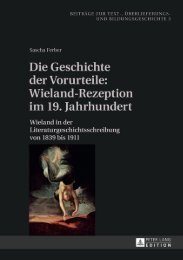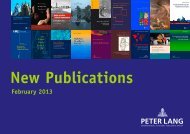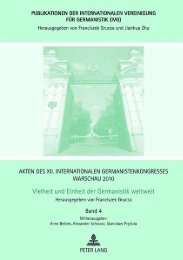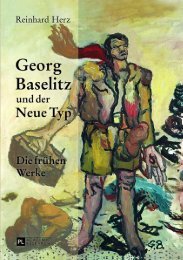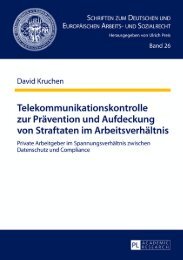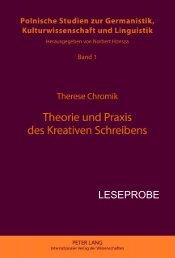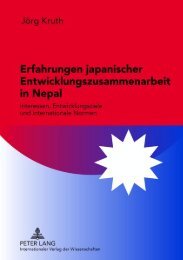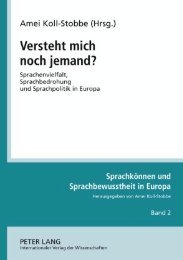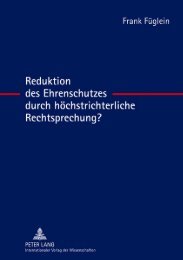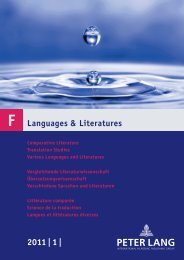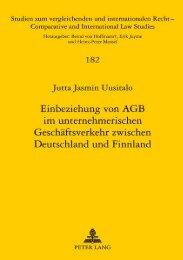Comparative Literature - Peter Lang
Comparative Literature - Peter Lang
Comparative Literature - Peter Lang
You also want an ePaper? Increase the reach of your titles
YUMPU automatically turns print PDFs into web optimized ePapers that Google loves.
16<br />
Slavonic <strong>Lang</strong>uages and <strong>Literature</strong>s<br />
Slavistik<br />
<strong>Lang</strong>ues et littératures slaves<br />
English Titles<br />
Jeremy Morris<br />
Mastering Chaos<br />
The Metafictional Worlds<br />
of Evgeny Popov<br />
phenomenon of Popov’s self-fictionalization<br />
in both his shorter and longer works up to<br />
the present day.<br />
Jeremy Morris is Lecturer in Russian at<br />
the University of Birmingham. His interests<br />
include contemporary Russian literature,<br />
culture and society and his current research<br />
is focused on ethnographic approaches to<br />
understanding lived experience in the former<br />
Soviet Union.<br />
Oxford, Bern, Berlin, Bruxelles, Frankfurt am Main,<br />
New York, Wien, 2013. 234 pp.<br />
«<br />
pb. ISBN 978-3-03910-546-5<br />
CHF 60.– / € D 53.50 / € A 55.– / € 50.– /<br />
£ 40.– / US-$ 64.95<br />
eBook ISBN 978-3-0353-0452-7<br />
CHF 63.20 / € D 59.50 / € A 60.– / € 50.– /<br />
£ 40.– / US-$ 64.95<br />
This is an interesting and important<br />
book, the first attempt to encapsulate<br />
the highly idiosyncratic œuvre and career of<br />
Evgeny Popov, a major and controversial figure<br />
in the late Soviet and post-Soviet literary<br />
landscape.» (Michael Pushkin, University of<br />
Birmingham)<br />
«Morris is excellent in his treatment of<br />
the writer’s attitude towards the past and history;<br />
and he differentiates between Popov’s<br />
more nuanced and ambiguous view of the<br />
Soviet experiment and those writers, likewise<br />
liberals, who have adopted a ‘confessional’<br />
stance.» (Robert Porter, University of<br />
Bristol)<br />
«A broad contextualization of the works<br />
of this important Russian author.» (Christine<br />
Engel, University of Innsbruck)<br />
This is the first book devoted to the writings<br />
of Evgeny Popov (born 1946), a major<br />
and controversial figure in the late Soviet and<br />
post-Soviet literary landscape. The author<br />
uses a wide range of primary and secondary<br />
sources, many of them in Russian, alongside<br />
detailed analysis of the novels and stories<br />
themselves. The introduction charts the<br />
course of Popov’s personal and professional<br />
biography, including major turning points<br />
such as the Metropole affair of 1979. A chapter<br />
on critical contexts provides a clear account<br />
of the history of Popov’s reception.<br />
Other chapters focus on the first collection<br />
of short stories and the complexities of narrative<br />
voice, the concept of the ‘non-elucidatory<br />
principle’ at the heart of Popov’s poetics,<br />
and the short story cycles in Metropole<br />
and Catalogue, from the late 1970s and early<br />
1980s. Finally the author addresses the key<br />
T<br />
Leon Burnett • Emily Lygo (eds)<br />
The Art of Accommodation<br />
Literary Translation in Russia<br />
Oxford, Bern, Berlin, Bruxelles, Frankfurt am Main, New York, Wien, 2013.<br />
309 pp., 1 table<br />
Russian Transformations: <strong>Literature</strong>, Thought, Culture. Vol. 5<br />
Edited by Andrew Kahn<br />
pb. ISBN 978-3-0343-0743-7<br />
CHF 68.– / € D 60.20 / € A 61.90 / € 56.25 / £ 45.– / US-$ 73.95<br />
eBook ISBN 978-3-0353-0472-5<br />
CHF 71.65 / € D 66.94 / € A 67.50 / € 56.25 / £ 45.– / US-$ 73.95<br />
his collection of essays is a seminal contribution<br />
to the establishment of translation<br />
theory within the field of Russian literature<br />
and culture. It brings together the<br />
work of established academics and younger<br />
scholars from the United Kingdom, Russia,<br />
the United States, Sweden and France in an<br />
area of academic study that has been largely<br />
neglected in the Anglophone world. The essays<br />
in the volume are linked by the conviction<br />
that the introduction of any new text<br />
into a host culture should always be considered<br />
in conjunction with adjustments to prevailing<br />
conventions within that culture. The<br />
case studies in the collection, which cover<br />
literary translation in Russia from the eighteenth<br />
century to the twentieth century, demonstrate<br />
how Russian culture has interpreted<br />
and accommodated translated texts, and how<br />
translators and publishers have used translation<br />
as a means of responding to the literary,<br />
social and political conditions of their<br />
times. In integrating research in the area of<br />
translated works more closely into the study<br />
of Russian literature and culture generally,<br />
this publication represents an important development<br />
in current research.<br />
Contents: Alexei Evstratov: Drama Translation<br />
in Eighteenth-Century Russia: Masters<br />
and Servants on the Court Stage in the 1760s<br />
• Brian James Baer: Vasilii Zhukovskii, Translator:<br />
Accommodating Politics in Early Nineteenth-Century<br />
Russia • Natalia Olshanskaya:<br />
Turgenev’s Letters on Translation • Leon Burnett:<br />
Turgenev and the Translation of the<br />
Quixotic • Katharine Hodgson: Heine and<br />
Genre: Iurii Tynianov’s Translations of Heine’s<br />
poetry • Susanna Witt: Arts of Accommodation:<br />
The First All-Union Conference of Translators,<br />
Moscow, 1936, and the Ideologization<br />
of Norms • Elena Zemskova: Translators in<br />
the Soviet Writers’ Union: Pasternak’s Translations<br />
from Georgian Poets and the Literary<br />
Process of the Mid-1930s • Aleksei Semenenko:<br />
Identity, Canon and Translation: Hamlets by<br />
Polevoi and Pasternak • Philip Ross Bullock:<br />
Not One of Us? The Paradoxes of Translating<br />
Oscar Wilde in the Soviet Union • Emily Lygo:<br />
Free Verse and Soviet Poetry in the Post-Stalin<br />
Period.<br />
Leon Burnett is Reader in <strong>Literature</strong> at<br />
the University of Essex, where he is currently<br />
director of the Centre for Myth Studies. A former<br />
member of the executive committee of<br />
the British <strong>Comparative</strong> <strong>Literature</strong> Association,<br />
he was the main editor of its journal,<br />
New Comparison, from 1992 to 2000.<br />
Emily Lygo is Lecturer in Russian at the<br />
University of Exeter. Her research interests<br />
are mainly in twentieth-century Russian poetry,<br />
translation in the USSR and Anglo-Soviet<br />
cultural relations.<br />
€ D includes VAT – valid for Germany and EU customers without VAT Reg No · € A includes VAT – valid for Austria


